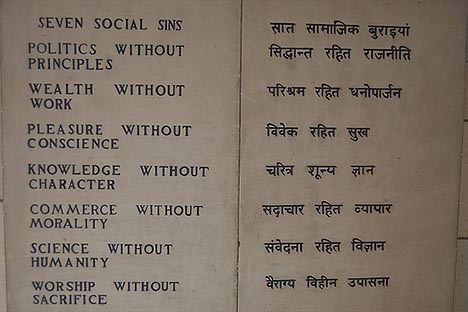The 7 social sins defined by Gandhi are a wonderful compilation of these behaviors that cause serious harm to a society, this spiritual and political leader was convinced that morality was a higher force, so he identified factors that were undermining social morals.
Moral forces are a set of values. These include religious, civic, family virtues, etc. This is all a whole form of ethics. And this ethic is the main driver of culture. Gandhi was an example.
“Strength does not come from physical ability. . Gandhi?
Social sins, on the other hand, refer to unethical behaviors and shape a situation that weakens society. When values are not strong, the response is very weak in times of crisis or difficulty. These are the social sins that Gandhi warned us about.
When we talk about politics, we immediately imagine only politicians, it has become common to criticize them and call them corrupt, we also use this idea as an excuse not to participate in politics.
However, we forget that we are also part of that regime that we are questioning, it is sustained through us, either by action or by omission, we are all involved in politics, as active or passive participants, the question is whether our participation helps to build values in politics or not.
Ambition is another factor that sometimes leads to social sins, when someone thinks only of their own well-being, the idea that good justifies any action often appears, personal success has become an excuse to commit the most sordid actions.
People who can be considered “good” end up believing that they “should be practical. “They call an idealist or a dreamer who implies morality in the subject. This type of behavior only leads to increasingly vague limits, and ends up prevailing over a kind of “law of the jungle”.
Work is not only a way of generating income, working and earning a living is also a factor that makes us worthy, on the other hand, living off other people’s work deteriorates our being and makes us social parasites.
Well-being must be the result of effort, in fact it is. It is common for those who live without being useful to rarely feel well, the opposite is normal: the person becomes insatiable, nothing ends up satisfying, nothing makes sense.
Education is a comprehensive process. When this is not understood, it gives rise to one of the social sins. Educating someone is not educating or forming. It doesn’t saturate you with knowledge or make you an expert at something, like a machine.
Anyone in charge of training someone should be aware that they must be firm in the face of the principles they impose, inconsistency is a bad message for someone in formation.
Although science serves humanity in the beginning, there are also many cases in which it does not, for example, when inaccurate or false information is promoted, supported by fraudulent research, or when experiments and research are carried out in which engage in unethical conduct with individuals. And animals.
The pursuit of pleasure is absolutely legitimate. Every human being has the right to seek what pleases his senses and his mind, the bad thing is that when we fall into excess, that same pleasure ends up hurting us.
Gandhi had a stoic view of it. In moderation he found one of the great virtues, to be responsible for enjoyment is to maintain balance against what produces pleasure, do not let it become a vicious excess, which ends up spoiling other values.
Even if Gandhi speaks exclusively of religion, in this case the principle can apply to any kind of spiritual belief, whether religious or not. When a belief is adopted, it is required that what exists in the mind and heart be translated into action.
One of the social sins is religion without sacrifice, because convictions without actions lose much of their value. When you really believe in something, you have to be willing to give up a lot of things for that.
These are therefore the 7 social sins defined by Gandhi. More importantly, his life was an example of how to combat this type of behavior. Even more relevantly, it has achieved everything it has achieved by applying its principles and supported by its moral strength.

